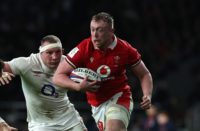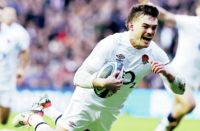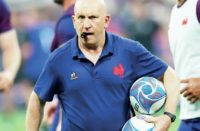 Selecting Billy Twelvetrees for his EPS squad is a smart move by Stuart Lancaster because he's selecting on form plus Twelvetrees provides a different style of play to Brad Barritt.
Selecting Billy Twelvetrees for his EPS squad is a smart move by Stuart Lancaster because he's selecting on form plus Twelvetrees provides a different style of play to Brad Barritt.
In the past I've described Barritt's negative points which are to do with his attacking ability but, more recently, I have pointed out how important he is to any team he plays in because of his defence. In the Aviva Premiership Barritt's tackle success rate is 96 per cent and Twelvetrees is 87 per cent. Barritt has made eight appearances while Twelvetrees has played every minute of all the games up until Round 13.
I wouldn't expect Barritt's percentage to get any worse, it appears he almost lives to tackle and, to start making a bigger impression than he already has, Twelvetrees needs to get up into the 90 per cents to be international quality.
Twelvetrees only has to listen to what Andy Farrell had to say about him after the EPS squad announcement on Wednesday: “If you look at the Leicester game a couple of weeks ago, there were a few coming down his channel and he was aggressive. He got stuck in, stood up for himself and showed a different aspect to his game.”
The last seven words should be loud and clear for Twelvetrees. He's got to improve because his defence in that game made an impression and his tackle success rate was 91 per cent.
Team and player statistics are now used by coaches in all sports. In rugby, whether you like them or not, coaches use them as they are pure fact, not reliant on subjective criteria and allow you to compare and contrast player attributes, removing emotion from a decision that is critical to team performance.
Statistics cause great discussion and debate so let's look at Barritt and Twelvetrees, comparing appearances, minutes played and remembering Twelvetrees has played two games at 10, to get a better perspective.
Barritt's stats tell me he looks after the ball well, is a very safe pair of hands, solid and dependable and I'm liking clean breaks five and defenders beaten nine.
Twelvetrees stats tell me he's a bit more of a risk taker and likes to attack. He's done well by winning 13 turnovers, but he's conceded 19 which could be anything from a knock-on, failure to find touch or a bad off-load, there's a whole list of criteria. Whatever, Twelvetrees has to remove unforced errors from his game which means execution has to be spot on. Once he achieves that there will be a big improvement on these stats. He mustn't stop taking risks and attacking, that's the basis of his game and sets him apart from most of his rivals.
If I'm judging by the eye and looking at future development of these two players I would say with Barritt you pretty much have the finished article in how he's going to play. You know what to expect and there's nothing negative about that because he does it extremely well, better than most, and he will refine and perfect through experience what he does know because he's only 26.
Twelvetrees – nicknamed 36 by ex-Tigers teammate Geordan Murphy because an Irish accent makes it sound like ‘twelve threes'– has a more varied skill set than Barritt so can broaden his game even more, but he shouldn't move on before mastering what he is trying to do now.
Twelvetrees has a huge opportunity to create another very competitive position in the England team; it's crucial he continues to work on drills and skills that will enable him to unlock defences. Although they both play in the same position they are different players and that's so refreshing and Stuart Lancaster should be very happy about having different options
At 6ft 3ins and 15st 10lbs Twelvetrees is an inch shorter than All Blacks' great Sonny Bill Williams and a stone lighter. The world of inside centres that have SBW ability are as rare as rocking horse manure but the bar has been set and someone has to nudge it up. If I were Twelvetrees I'd be aiming to bring some of what the Kiwi does into my portfolio of skills, analyse what could be incorporated and shed the rest, which won't be a lot!
SBW isn't renowned for his kicking, he doesn't need it but if he could choose to have that ability he would grab it, it's a valuable skill to have in your locker. More and more rugby today is about territory than possession and any player that can gain it is a huge asset and kicking is the quickest and easiest way of making ground.
If Twelvetrees can continue his current development path, learn quickly and not lose sight of why he plays rugby and not have it coached out of him then he could be the missing link from the England backline. A centre that passes naturally both left and right without thinking about it, wow. If you add Twelvetrees to Owen Farrell/Freddie Burns and Alex Goode your attack with vision, passing plus execution goes to another level.
For me his next step is attack even more, work on scanning the defence to find the stray slow forward, the dogleg in defence, the defender distracted, the backs moves that will shred a defence from set piece. A yard more pace wouldn't go a miss, which might mean losing a bit of weight.
But with sports science as it is he should find a way of increasing speed without compromising his weight too much.
By the time RWC 2015 rocks up I'm sure Lancaster would like to have at least three players in his backline capable of scanning defences and having the skills to see when it's on and go for it. The more footballers in the team the more likely players will have a go knowing others will follow instinctively.
Burns, Twelvetrees, Goode, Mike Brown, Manu Tuilagi and Ben Foden have that unconscious feel to know when it's on, like a deep sea fisherman feels the wind change and knows a storm is on it way, these players can ride the waves and cut the smoothest pathway through defences. Twelvetrees has it all in front of him to do including Barritt who is fast proving he's almost indispensible.

























